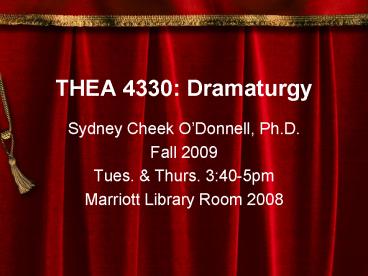THEA 4330: Dramaturgy - PowerPoint PPT Presentation
1 / 19
Title:
THEA 4330: Dramaturgy
Description:
Prepares program notes, study guides, and other outreach materials ... Create outreach materials (e.g., program note, study guide) for one play. ... – PowerPoint PPT presentation
Number of Views:1236
Avg rating:3.0/5.0
Title: THEA 4330: Dramaturgy
1
THEA 4330 Dramaturgy
- Sydney Cheek ODonnell, Ph.D.
- Fall 2009
- Tues. Thurs. 340-5pm
- Marriott Library Room 2008
2
What is a dramaturg?
- A collaborative artist who seeks out and presents
pathways into the world of the play for all
constituents of a theatrical production,
including the director, actors, designers, and
spectators.
3
No, seriously, what is a dramaturg?
- A play doctor or script doctor
- The information designer
- The audience before the audience
4
So what does a dramaturg actually do?
- Analyzes plays
- Assists directors to develop concepts
- Provides research materials to the production
team - Selects translations, makes cuts to texts
- Serves as an in-house critic
- Prepares program notes, study guides, and other
outreach materials - Facilitates events connected with a production,
e.g. talk-backs or expert panels
5
What skills does dramaturgy develop?
- Analytical skills
- Critical thinking
- Creative problem solving
- Research skills
- Organizational skills
- Information management skills
- Communication skills
6
Who benefits from dramaturgical training?
- Directors
- Actors
- Designers
- PR and Marketing Professionals
- Spectators
- Critics
- Historians
7
Directors
- Hone facilitation skills to more effectively lead
your creative team. - Learn to envision more creative choices.
- Develop communication skills.
- Identify and connect with your audience.
8
Actors
- Become close readers of plays.
- Learn to identify key moments in order to prepare
effectively for auditions. - Hone research skills for use in developing
characters.
9
Designers
- Hone close-reading skills.
- Spark your imagination with a wide variety of
source materials. - Develop research skills.
- Learn to communicate with collaborators.
10
PR and Marketing
- Locate information that will attract and serve
audiences. - Learn to communicate key ideas and information to
audiences. - Create outreach materials for audiences of adults
or students.
11
Spectators
- See more -- What is happening on the stage or
page - Question more -- What is happening in this play
and why? - Understand more -- Get more out of the experience
of seeing or reading plays - Enjoy more -- With dramaturgical training, even a
bad show becomes an interesting experience. And
a good show becomes great because of what you
bring to it!
12
Critics
- Get a deeper understanding of the production
process and the array of interpretive choices
available in a single play text. - Learn to share that understanding with popular
audiences -- become a mediator and a facilitator.
13
Historians
- Learn to connect historical information to plays
in production. - Learn to deliver historical information to
theatre artists as well as popular audiences.
14
Who can be a dramaturg?
- Everyone working on a production.
- Anyone who asks what and how a play is meaningful
to an audience today. - Anyone who works collaboratively in creative
endeavors. - Anyone who loves to ask questions and work to
discover possibilities
15
What will we do in class?
- Read, see, write about, and discuss plays with an
eye for structure. - Read about and discuss the theory and practice of
dramaturgy. - Meet regional theatre professionals.
- Conduct research on at least two plays.
- Create outreach materials (e.g., program note,
study guide) for one play. - Create a casebook for one play.
- Do a dramaturgical presentation for the class.
16
What else do I need to know?
- The prerequisite for this class is either THEA
1713 or the permission of the instructor. - This class is designed as a workshop / seminar,
which means that there will be little, if any,
lecture. Class time will be spent on discussion
and hands-on exercises. Thus, student preparation
for class and curiosity are essential.
17
And finally
- If you like ideas, this is the class for you
Learn to juggle--without using your hands or
feet--eight, nine, ten, twenty, a million ideas
that offer mutually exclusive, potentially
deadly, but absolutely marvelous authorless
solutions!
18
For more information
- Contact Dr. Sydney Cheek ODonnell at
cheek.odonnell_at_utah.edu or 801-585-1080 - Contact the Department of Theatre at 801-581-6448
19
THEA 4330
- Meets Fall 2009, Tues. and Thurs. 340-5pm in
Marriott Library, room 2008 - Meets with THEA 4335, Honors Dramaturgy
- Prerequisite THEA 1713 or instructors approval





![[Download ]⚡️PDF⚡️ Ghost Light: An Introductory Handbook for Dramaturgy (Theater in the Americas) PowerPoint PPT Presentation](https://s3.amazonaws.com/images.powershow.com/10071539.th0.jpg?_=20240703110)
















![[PDF] READ Free Three Sisters (Hackett Classics) PowerPoint PPT Presentation](https://s3.amazonaws.com/images.powershow.com/10091853.th0.jpg?_=20240803026)








